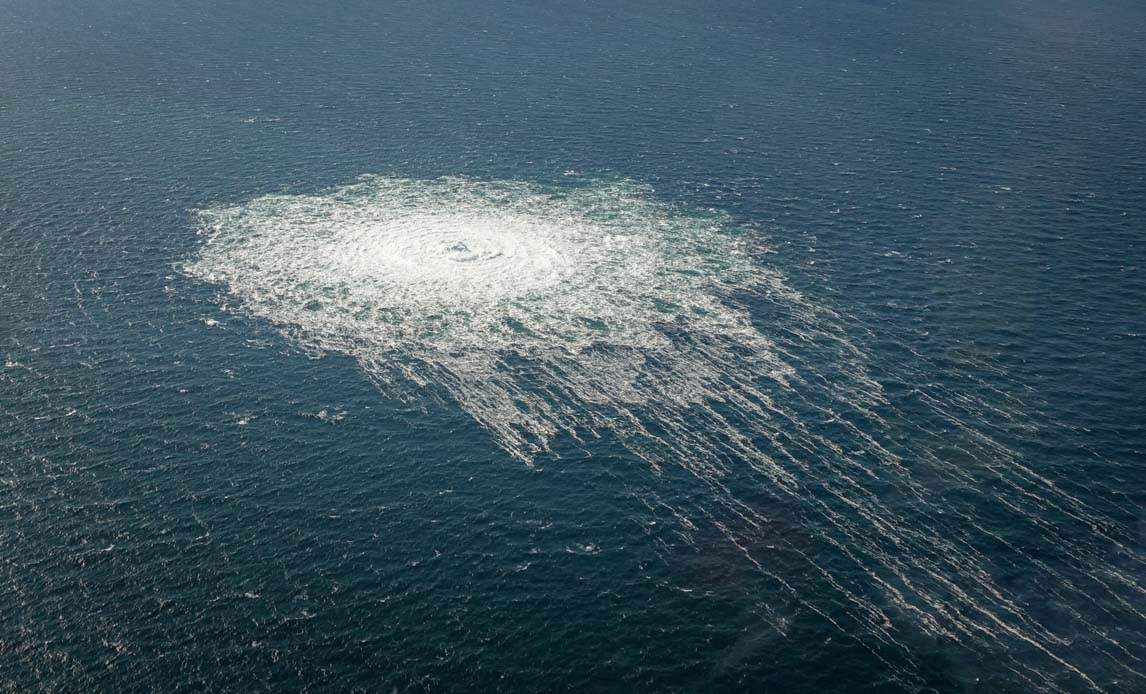
Sudden and unexplained leaks from the undersea Nord Stream pipelines from Russia to Germany appear “not a coincidence”, the European Union has said, a statement which adds weight to fears of sabotage.
The bloc’s foreign policy chief Josep Borrell warned on Wednesday: “Any deliberate disruption of European energy infrastructure is utterly unacceptable and will be met with a robust and united response.
“All available information indicates those leaks are the result of a deliberate act.”
As gas continued to spew into the Baltic Sea, it remained far from clear who might be behind the leaks or any foul play, if proven, on the pipelines that Russia and European partners spent billions of dollars building.
The pipelines recently burst in several locations in the exclusive economic zones of Denmark and Sweden while neither of them was in operation amid an energy standoff between Russia and Europe.
NATO Secretary-General Jens Stoltenberg overtly attributed the leaks to sabotage.
“Discussed the sabotage on the NorthStream pipelines with Defence Minister Morten Bødskov,” he said on Twitter, referring to the Danish official.
“We addressed the protection of critical infrastructure in NATO countries.”
Operator Nord Stream has called the damage “unprecedented”, while Gazprom, the Russian-controlled company with a monopoly on its gas exports by pipeline, declined to comment.
Discussed the sabotage on the #NorthStream pipelines with Defence Minister @mfMorten of our valued Ally #Denmark. We addressed the protection of critical infrastructure in #NATO countries. pic.twitter.com/GCRgVOTR2S
— Jens Stoltenberg (@jensstoltenberg) September 28, 2022
After the leaks were reported, Ukraine accused Russia of damaging the pipeline, saying the alleged actions amount to “nothing more than a terrorist attack.”
Kremlin spokesman Dmitry Peskov told reporters on Tuesday, when asked about sabotage: “No option can be ruled out right now.”
He added that the energy security situation for the “entire continent” requires prompt investigation.
On Wednesday, Peskov dismissed suggestions that Russia was responsible for possible attacks on the Nord Stream gas pipelines as “quite predictable and also predictably stupid”.

Two gas leaks
On Tuesday, Sweden and Denmark reported significant leaks from the two pipelines.
The leaks were detected on the Nord Stream 1 pipeline, which stopped delivering gas to Europe last month, both in an area northeast of the Danish island of Bornholm.
Danish authorities have asked ships to stay clear by a five nautical-mile radius off Bornholm after the leak at Nord Stream 2, which has yet to enter commercial operations.
The plan to use it to supply gas was scrapped by Germany days before Russia sent troops into Ukraine in February.
Footage published by Danish authorities from the damaged pipeline showed bubbles rushing to the surface of the Baltic sea.
The surface disturbance was reported to be well over 1 kilometre in diameter.
Environmentally, the escaping greenhouse methane gas would have a damaging climate impact.
Denmark’s Bødskov pointed at Moscow.
“Russia has a significant military presence in the Baltic Sea region and we expect them to continue their sabre-rattling,” he said.
United States Secretary of State Antony Blinken said: “If it is confirmed, that’s clearly in no one’s interest.
“My understanding is the leaks will not have a significant impact on Europe’s energy resilience.”

The EU on Wednesday rushed to ramp up security to safeguard the bloc’s energy infrastructure in response to the damage, while warning of a “robust and united response” in case of further attacks.
At the same time, Gazprom, which supplies gas to Europe via Ukraine, announced in a statement that Russia could sanction Ukraine’s Naftogaz due to ongoing arbitration, a move which could heighten Europe’s energy woes.
Analysts at ING bank said: “This is an important development to watch because if Naftogaz is sanctioned, Gazprom will not be able to pay transit fees to the company for Russian gas which goes via Ukraine to Europe.”
This risked the complete halt of flows and would tighten up the European market further heading into the heating season, ING’s analysts said.







